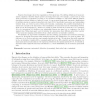103 search results - page 14 / 21 » Computational Interpretations of Classical Linear Logic |
ECOI
2007
13 years 6 months ago
2007
Experts often disagree about the organization of biological taxa. The shifting definitions of taxonomic names complicate otherwise simple queries concerning these taxa. For examp...
PR
2010
13 years 5 months ago
2010
Selecting relevant features for Support Vector Machine (SVM) classifiers is important for a variety of reasons such as generalization performance, computational efficiency, and ...
LICS
2006
IEEE
14 years 22 days ago
2006
IEEE
We give a semantic characterization of bounded complexity proofs. We introduce the notion of obsessional clique in the relational model of linear logic and show that restricting t...
AIPS
2006
13 years 8 months ago
2006
Temporally extended goals (TEGs) refer to properties that must hold over intermediate and/or final states of a plan. Current planners for TEGs prune the search space during planni...
LATIN
2004
Springer
14 years 2 days ago
2004
Springer
Abstract. We present a probability logic (essentially a first order language extended with quantifiers that count the fraction of elements in a model that satisfy a first order ...

